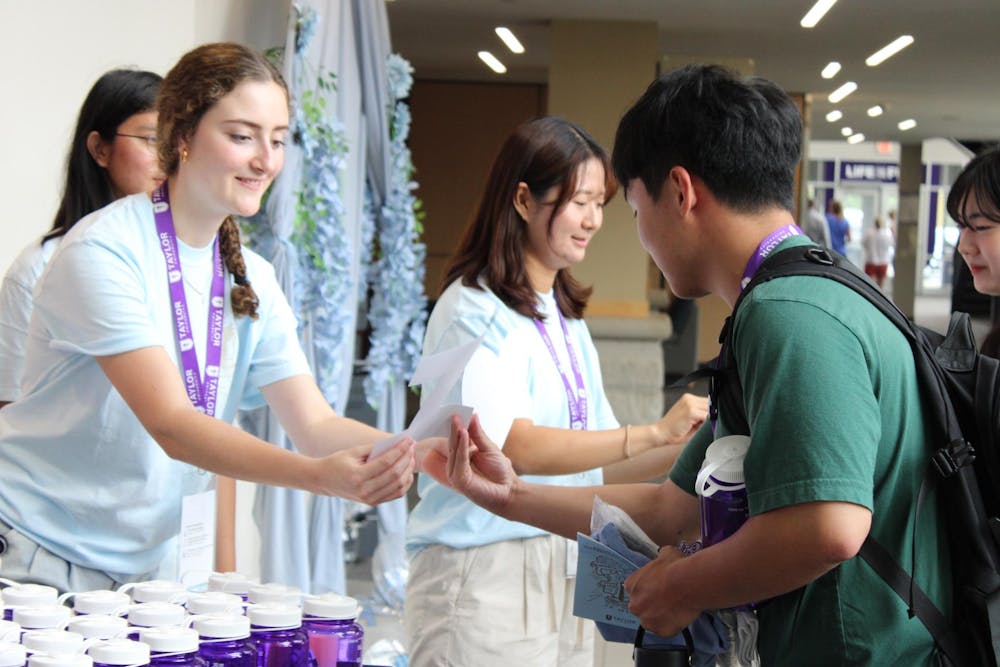Recent changes to student visas are impacting the U.S. — affecting even small Christian schools tucked away in the cornfields.
Eight freshmen and two transfer international students expecting to start their studies at Taylor University this fall were unable to do so due to visa issues and denials, according to admissions counselor Giovanna B. Domene Shilts. An additional seven Master of Arts in Higher Education (MAHE) students are absent for visa reasons, Joon Lee, MAHE graduate assistant, said.
Junior Jill Xie is an international student from China and a director of Taylor’s International Orientation. She remembered preparing for the international freshman arrivals but found out they were not coming.
“They would prepare their name tags and everything, and then all of a sudden — ‘Oh, they can’t be here anymore,’” Xie said.
Recent changes affecting student visas
Notable changes to student visas started in spring 2025, when the Trump administration cancelled more than 6,000 student visas, according to a Reuters article. Approximately 4,000 visas were revoked due to ranging levels of criminal activity.
The visa cancellations resulted in100 plus students filing lawsuits against the government, according to BBC. These students believed they had been wrongfully stripped of their student status.
The administration backtracked on the visa revocations April 25.
At the end of May, The U.S. Department of State (DOS) paused student visa interviews and incorporated new social media vetting policies. These vetting procedures required applicants to provide consular officers with all their social media accounts.
Students had to make their accounts public for review, Nate Chu, director of International Student Programs, said.
While the DOS resumed visa interviews in June, another wave of change followed. The Trump administration announced a travel ban, affecting 19 countries.
Chu, however, is most concerned about the growth rate of student visa declines. In 2014, the overall student visa decline rate was 15%. In 2024, decline rates were up to 41%. This increase has had rippling effects on Taylor.
Historically, Taylor has not had issues with admitted Chinese students being denied visas, Chu said. This year, the U.S. denied visas for two or three Chinese students who had plans to study at Taylor in the fall.
The visa application process
The U.S. issues many kinds of visas, Chu said. International students are on either F-1 or J-1 status, with the vast majority of Taylor students being on F-1 student visas, he said.
Once an international student is accepted and admitted into Taylor, they begin the visa process. The student will submit a document demonstrating the financial means to fund their education, and then Taylor will issue the student an I-20, a document allowing them to stay in the U.S. for their studies.
The visa gets a student into the country, and the I-20 gives them permission to stay, Chu said.
Once issued the I-20, students can schedule an in-person interview — the crux of the application process — where they will either be approved or denied a visa.
The interview is typically 30 seconds to a minute, Chu said. The student arrives equipped with a plethora of documents and will answer questions from the consular officer regarding why they are coming to the states.
Joon Lee remembers thoroughly preparing for his interview. He arrived at the meeting with a thick binder of documents. Because of the unpredictable nature surrounding what the officer might want or ask, it is recommended to arrive with a range of paperwork including academic transcripts, financial documents, family documents and more.
Xie also remembers the day she interviewed.
“It is really dependent,” she said. “For me, it was like gambling, because when I was in line, I see the people either receiving a green paper (approved) or a yellow paper (refusal or further review). I was like, ‘Oh, that person received a green paper. I hope I can too.’”
Future potential changes
The Trump administration announced the most recent development surrounding student visas Aug. 27.
The proposed rule, if approved, would end the “duration of status” policy.
The duration of status policy allows international students to stay in the U.S. for however long their academic program or training requires.
Theoretically, a student could do undergraduate school, a few years of practical training in their field study plus a two year master’s program all on the same visa, Chu said.
The proposed rule would change the length of the I-20 from “duration of status” to a cap of four years, Chu said. If they do not complete their academics in four years, they will have to apply for extensions directly with the United States Citizenship and Immigration Services (USCIS), according to the Department of Homeland Security’s (DHS) report.
The DHS is reviewing public feedback on this proposed change.
As a MAHE student, Lee hopes to work in higher education one day. Watching these changes unfold, he wonders how these events will continue to affect Christian institutions, but also public universities that host larger populations of international students.
Speaking from the perspective of an international student from Korea, Lee said international students are here to learn — to learn and contribute their own experiences. International students are able to add to the wealth of knowledge in the higher education setting, he said.
“These policies against international students, preventing them from either coming or being more antagonistic towards certain countries, I think, also have larger diplomatic effects on students,” Lee said. “Not only students, but also on countries, right? How do we now view higher education? How does the world view higher education in America, and how does the world view the U.S. as a place of education, but also of learning? Is it a welcoming space? Is it a welcoming space or not anymore?”





